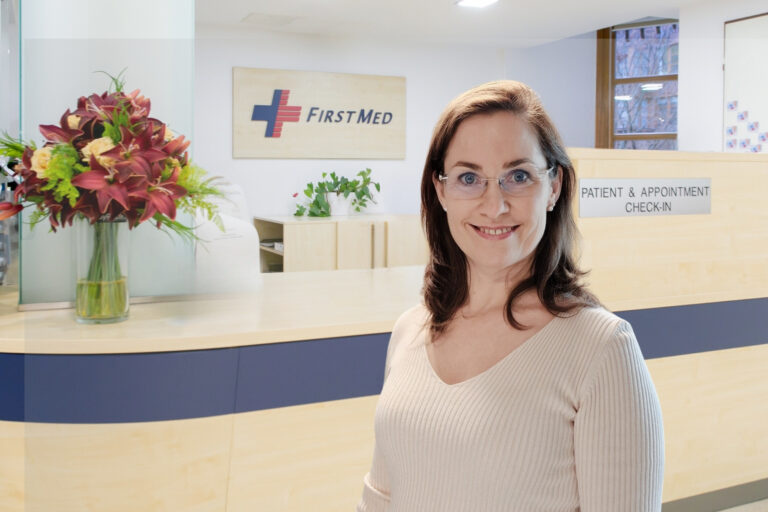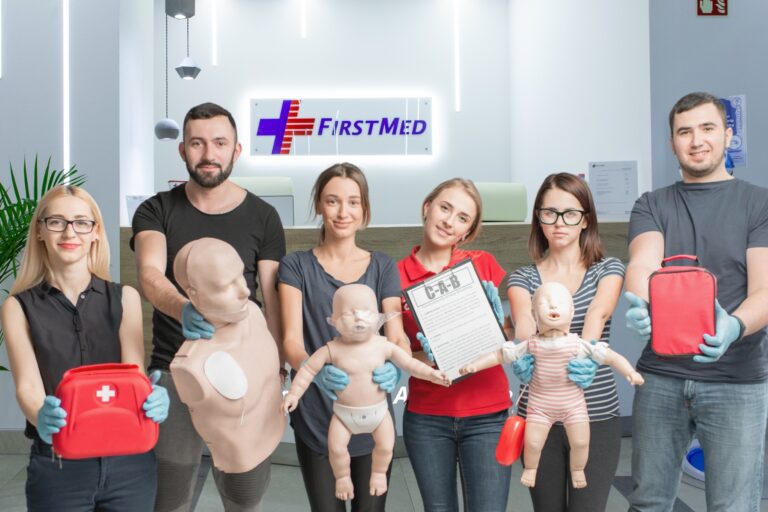Dr. Ágnes Hegedűs, general practitioner and diabetologist. She is a medical professional with an exciting background, a great desire to help people, and a boundless source of new ideas stemming from her background and perspective. Let’s see where this all comes from.
How did you get started in the medical field?
I come from a family with “strong chemistry”. My father is a pharmacologist and my mother is an isotope researcher. Thus, medicine has never been an entirely foreign field. Traveling a lot in the 1980s, my father spent much time in Holland and England. In 1986 he received a fellowship to the United States’ NIH (National Institutes of Health) and soon the entire family joined him there in time to celebrate the New Year together. Although I was just six years, I learned the language and culture, along with a positive attitude and thinking which left a definitive mark I carry to this day. After the Hungarian political changes in the early 90s, by 1992 my parents decided to return partly home so we would not to lose sight of our cultural roots; something easy to do in America.
Continuing my studies I gravitated towards natural history and sciences, with family encouragement as well as a natural inclination. Of course I excelled in sciences, especially chemistry, as to not bring shame on the family name. Before applying to the medical school, I thought of becoming a geologist, or even a cartographer, but those whims proved to be just that and my application ended going to Semmelweis Medical University. It was extremely competitive application process, so I tried twice, studying biology at ELTE, in the year between.
Following a friend’s advice while in university, I worked in the Diabetology Department of Budapest’s St. John Hospital. I gained experience and knowledge across multiple fields of medicine, especially in patient care and administration which was immeasurably useful later. After three years and a short break, with my diploma in hand, I continued working in the emergency department for the next five years. This field became my second love; the only shortcoming being the exceptionally low salary. I needed to find a way of supplementing my income to support my work so I found a job as an on-call doctor in the 11th district working nights and weekends. This opened my eyes to the real world through meeting people from all walks of life and a variety of conditions.
You don’t have to go to as far as Africa, Borsod County, or even the 8th district to find heartbreaking stories. It is enough just to ring a bell of an apartment in one of the blocks on Bartók Béla út in the 11th district to bring you face to face with the bitter reality of people and the tragic circumstances around us.
Many of us don’t know our neighbors or how they live; the indifference is striking. I believe it would be useful for everyone to work with the less fortunate from time to time, in order to have a better understanding of what they have and the circumstances they live in.
Why did you decide to stay in Hungary?
While my younger brother lives in Germany, I decided to stay. It took me about three months in America to learn the language—easy for a six-year-old—and manage to assimilate to the culture. By the age of ten my American classmates began ostracizing me for being a foreigner. Of course returning to Hungary was no better, feeling as much an outsider here as when I was in the US. After a while I began feeling at home and started making friends. I didn’t want to leave; I preferred to settle down.
When and how did you hear of FirstMed?
After long years of working in the hospital it stopped being satisfying, so I began to search for new alternatives.
There comes a time then you realize your time is over at a given place. You need to have a sense of achievement, to know what direction you are heading, what you would like to accomplish and how your current workplace contributes to it. You should know the reason why you go to work every day and to love what you do. It is hard to say goodbye to a position that has given you a lot of satisfaction, friends, and a livelihood. If it doesn’t help you on your way to growth then it is best to resign and find your next step.
A friend told me that she saw FirstMed was looking for doctors so I sent my CV. Even after the first interview I was left with a positive impression the main clinic’s focus, outside of medical care, is not on the rules and restrictions, but rather the opportunities. I started working part-time in February of this year and it grew quickly into a full-time position when we both knew it was a good fit.
Was this what you were expecting?
It is a totally different world. Colleagues here are helpful, kind, not just to comply with rules, but because they love their jobs and are committed to certain standard. Everyone looks after the patients and pitches in where possible; it’s quite team-like. It’s night and day with the national health system I came from. I enjoy using my English and that I am challenged with new and varied tasks pushing me to brush up on existing knowledge or learn new skills. Up to this point I had never worked in only one position at a time, but I like it; It fills me with relaxed satisfaction. I appreciate the extra time that allows me in dealing with not only the given problem of my patients, but the entire human being in a tranquil environment. I feel more balanced now as a doctor.
Do you have anything you would like to share here as a diabetologist?
I would like to take the opportunity to address those diabetics that are on medication. I feel the time has come to modernize the diabetic treatment. According to the latest studies in the field, the older medications may cause nighttime hypoglycemia. Though not easily observed by the patients, it may cause further illnesses such as arrhythmia, or other dangerous circulatory problem, making it necessary to double check patients who regularly take it. This way we can prevent numerous cases of morning stroke, sudden heart failure, or arrhythmia.
I strongly advise everyone to regularly check their blood sugar level, as early detection plays an important role in the therapy of the above illnesses as well.
Contact us to schedule an appointment with Dr. Ágnes Hegedűs.




